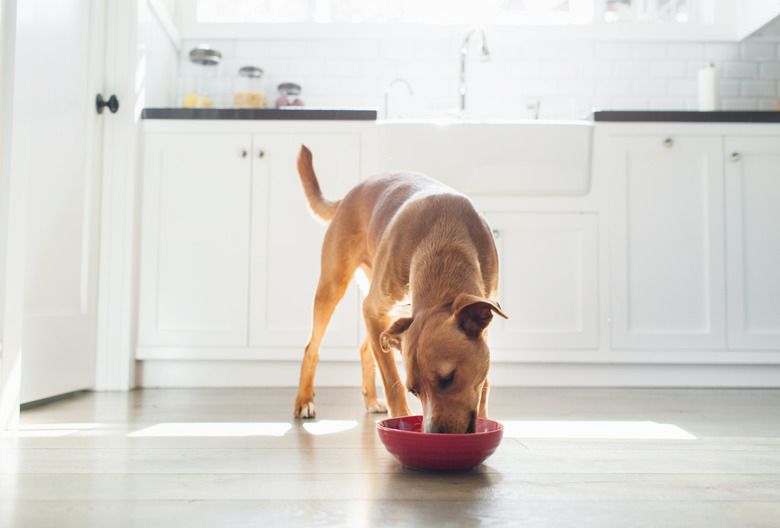A List Of Which Raw Vegetables Are Good For Your Dog
You're sitting in front of the television snacking on something healthy, like baby carrots or celery sticks, and your dog wants some too. Is it OK to give raw vegetables to your dog? The good news is that there are many dog-friendly vegetables, and while humans benefit from eating raw vegetables and fruits, dogs can too.
Nutrients in dog-friendly vegetables
Nutrients in dog-friendly vegetables
The American Society for the Prevention of Cruelty to Animals says that there are six major groups of nutrients that dogs need in order to be healthy: water, protein, fats, carbohydrates, vitamins, and minerals. Most vitamins and minerals cannot be synthesized in the body and are therefore essential in the diet. Nutrients in dog-friendly vegetables don't typically include protein, carbohydrates, or fat, although some vegetables can contain some of these things.
Vegetables to avoid
Vegetables to avoid
While most vegetables won't harm dogs, the American Kennel Club says some of them should still be avoided. Asparagus, for instance, is too tough to be eaten unless it's cooked, and once it's cooked, it loses the nutritional benefits. Mushrooms are best avoided altogether so your dog doesn't accidentally ingest any toxic varieties. Broccoli (and related cruciferous or leafy vegetables) is OK in only small quantities because it can cause gas, and hard broccoli stems might get stuck in a dog's throat.
Hazardous vegetables to avoid feeding to dogs include:
- Anything in the chive family (garlic, leeks, onions, chives)
- Horseradish
- Onions
- Rhubarb
- Shallots
- Taro
- Wasabi
- Watercress
Green leafy vegetables
Green leafy vegetables
Green leafy vegetables include:
- Spinach
- Kale
- Collards and other greens
- Cabbage
- Lettuce
- Bok choy
All of these are OK but come with some warnings. Cabbage can cause an excess of gas, and aren't dogs already gassy enough? Spinach too should be fed in moderation. It contains an element that can lead to kidney damage and blocks the body's ability to absorb calcium, although your dog would probably have to eat a very large amount of spinach for this to become a problem.
Dogs can eat bok choy, according to Link AKC, although take note of the effect it has on your dog. It might be grouped with the gas-causing vegetables that you might want your dog to avoid.
Root vegetables for dogs
Root vegetables for dogs
Dogs can safely eat most root vegetables, but there are a few exceptions. Root vegetables are considered to be any vegetable that grows underground, including:
- Carrots
- Potatoes, yams, sweet potatoes
- Beets
- Parsnips, turnips, rutabagas
- Radishes
Onions, garlic, and leeks are no-nos. All alliums are toxic to pets. Carrots, however, are an excellent low-calorie, high-fiber snack for dogs. They love the crunch (which is also good for cleaning their teeth), and they get some vitamin A.
The Whole Dog Journal warns against feeding an abundance of root vegetables because they are starchy and high in sugar. If your commercial dog food already contains root vegetables, and many do, your dog may already be getting enough.
Other considerations and warnings
Other considerations and warnings
It is easy for dogs to consume too much vitamin A. This can cause bone and joint pain, brittle bones, and dry skin. Excess vitamin D may result in very dense bones, soft tissue calcification, and kidney failure. If you know your dog is a fan of vegetables that provide an abundance of these nutrients, make sure you're feeding her only moderate amounts.
Vegetables safe for dogs
Vegetables safe for dogs
Raw vegetables that are safe for dogs, according to the American Kennel Club, include:
- Broccoli
- Brussels sprouts
- Carrots
- Celery
- Green beans
- Peas
- Spinach
If you think your dog has eaten something harmful, call the American Society for the Prevention of Cruelty to Animals's poison control center at (888) 426-4435.
References
- American Society for the Prevention of Cruelty to Animals: Animal Poison Control
- Whole Dog Journal: What Vegetables Can Dogs Eat?
- Link AKC: The Ultimate Guide to Safe & Unsafe Produce for Dogs
- American Kennel Club: Fruits and Vegetables Dogs Can or Can't Eat
- American Society for the Prevention of Cruelty to Animals: Dog Nutrition Tips
